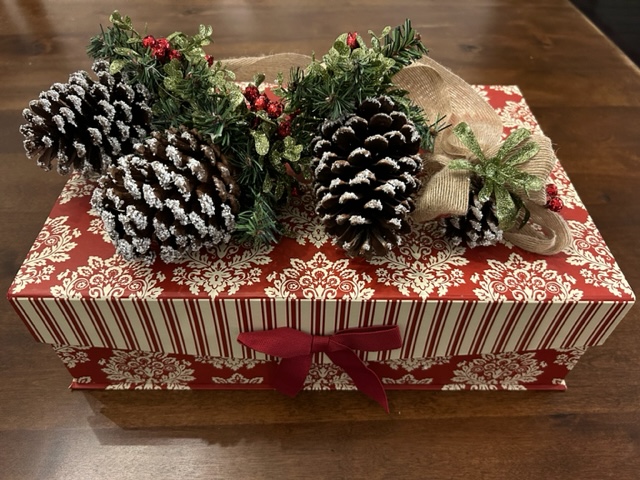The Box

An Essay by Maria Hanley
Each year, the holiday season arrives in a comforting haze of twinkling lights and abundant cheer. We dust off the decorations, crank the carols, and embrace the Christmas spirit. For a few blissful days following Thanksgiving, I am convinced this is truly “the most wonderful time of the year.” Then, with a deafening thud on our doorstep, the box arrives.
As holiday cards fill our mailbox, the box appears every year like clockwork, bursting with an entire advent calendar’s worth of gifts for our three boys. The presents are small and inexpensive; stickers, candy, and small toys were typical when the boys were young. As my children have grown, the gifts have transitioned with them; many are now bags of puzzle pieces, sections to be completed over the course of the season.
Although this may sound like the work of elves, this box doesn’t come from the North Pole. For almost two decades, a distant relative has taken it upon herself annually to choose, wrap, and mail age-appropriate gifts for our family—acts of generosity by any measure. So why do I have such an aversion to this box, so powerful that some years I have allowed it to sit by the door, unopened, lest the contents shatter my magical Christmas spell?
Before you call me Scrooge, this box has a back story. Eighteen years ago, this relative gifted us a homemade advent calendar as a wedding present. Upon first sight, I eyed it warily; lovingly stitched against a panel of deep green felt were different-sized and shaped pockets, adorned with puff-painted numbers and glittery designs. The calendar came with the promise of an annual box of presents to fill the compartments; the real “gift” was the tradition. Unconvinced, I agreed to play along.
As our family grew, the curtain was lifted on Christmas and, in turn, the heart of my conflict with the calendar and the contents of the box. December was no longer a party boat of mistletoe, eggnog, and cocktail parties. Suddenly, there was more work to be done. Remember how much fun it was, as children, to decorate gingerbread houses? Someone must make them. And those gorgeous platters of Christmas cookies, cut, frosted, and sprinkled just so? Someone must bake all of those, too. Trees don’t decorate themselves and gifts don’t get magically wrapped. Attach an infant to your hip, throw a clingy toddler in the mix, and December is a holiday pressure cooker.
From an aesthetic perspective, the homemade calendar clashed with my more refined holiday vision—a vision, I should note, that was not rooted in the reality of the baby wipes on the dining room table, the stroller in the hallway, our potty-training toddler’s underwear on the floor, and beads yanked off the Christmas tree by our newly-walking infant. My “vision” was laughable, but that was never the crux of the issue.
The truth was, somewhere along the way—and this is clearly a first-world problem—I had unwittingly joined the team of exhausted mothers engineering the bulk of Christmas “magic.” I was barely managing the decorating, baking, wrapping, and that darned Elf on the Shelf (also a gift!). The daily calendar present and the chaos that erupted from trying to remember whose turn it was to open a gift (I lost track many times), in addition to managing pouty children, were just enough to tip the scale for me on this “tradition.”
I wasn’t just exhausted. As a new mother, I was also territorial, and I bristled at the implicit suggestion underlying the calendar: that my children needed this tradition in their lives—one that I, as their mother, was not providing. In my wary, sleep-deprived state, I took the offering to mean “my Christmas” was not sufficient, and a seed of resentment sprouted in my heart.
When our youngest was in preschool, my mother came to stay at the beginning of the holiday season. One weekday morning, as she sipped her coffee and I flitted around the kitchen assembling lunches, the boys asked to open their gifts from the calendar. “Quickly,” I sighed.
With lunches packed and backpacks by the door, I willed my nine-year old to open that day’s gift and move along. Instead, in a painstakingly slow and intentional manner, he peeled the wrapping paper off a king-size chocolate bar. After all I had conceded to this tradition over the years, the calendar was actually going to make us late for school.
“I want some!” My seven-year-old grabbed the bar.
“No, it’s mine!” My oldest yanked it back.
The next few moments unfolded in a horrifying, slow-motion sequence of family chaos. My mother froze, wide-eyed, her mug of coffee held mid-sip, and our preschooler, temporarily distracted from constructing a train track across the entryway, gaped. My older boys tugged the bar back and forth, smashing and smearing chocolate in the warmth of their fists, tumbling to the floor and wrestling each other for the fragmented prize.
“Enough!” I hollered, calling off Advent as soon as it began. Years of contempt for this “tradition” had taken their final toll. I was at breaking point.
After delivering the boys to school, I poured more coffee and seethed. “I hate that calendar.” My mother listened as I ranted about the nerve of anyone being so presumptuous as to “push” a tradition into anyone’s home, especially when I was the one who “made it happen.” The calendar was nothing more than another Christmas chore.
When I lost steam, the silence was deafening. My mother finally said, “Are you saying that someone chooses, wraps, and sends that whole box of gifts justfor your boys? Just because?”
Childlike, I scowled at my coffee, even as the rich aroma invited me to soften.
And then she said something I’ll never forget. “Honey, I think you need an attitude adjustment.”
An attitude adjustment? The person who needed the attitude adjustment was the relative who kept sending that blasted box of gifts. I doubled down, and my Grinch-like heart shriveled. Somehow, we made it to Christmas that year, and a few more after that, but the calendar, its contents, and I, were at an impasse.

Still, the box arrives. A year or two ago, as I pulled Christmas decorations from storage, I noticed some of the stitching on the calendar was loose, and some of the puff paint had peeled. It was literally hanging by a thread. In the silence of my heart, I could see the calendar had worked hard. Like a Who in Whoville, it had sung its song over the years, even in the face of a mighty Grinch’s rejection.
The boys, older now, have opened enough of these gifts that the tradition now includes their humorous predictions as to what each contains before they are unwrapped. I like to think we are past physical combat for candy (no guarantees in this household), but it has never been the gifts that take their hearts. Rather, their shared anticipation and delight in a simple surprise bonds them.
As for my attitude, my mother was right. For reasons I may never fully understand—nor do I need to—this box arrives full, on time, and personalized every December. This Christmas, we are due to receive our eighteenth box of gifts. Who am I to begrudge someone their Christmas joy? I may not have chosen this tradition, but I have come to believe it chose me.
As a young mother, I took the “work” of the holiday season too seriously and personally. But as the calendar aged, so has our family; more recently, I have caught glimpses of future Christmases when my boys are grown, perhaps spending the holiday elsewhere, all of that “work” a thing of the past. Traditions are like buoys, keeping memories afloat, something to keep in our mind’s eye even as we outgrow them. The real work of the season is to make them our own.
These days, the box no longer sits by the door. While the original calendar has come and gone, another wedding gift serves as its replacement: a large, glass bowl, durable like the Christmas tradition that has taken its rightful place in our household, and clear as an open heart. Now, when that box arrives, I thank the ghosts of Christmas Past, Present, and Future for another season with my family, another chance to wrestle over a chocolate bar, and, like the Grinch, my heart grows three sizes as I fling stolen gifts across the room to their rightful owners. I like to think that finally, I’ve done this tradition proud.

Maria Hanley began writing in her forties. Her short stories have appeared in Discretionary Love, Grande Dame Literary Journal, and Potato Soup Journal, and her essay, “Holy,” placed second in the 2021 Soul-Making Keats Literary Competition for memoir-vignettes. She plans to tackle a novel someday, sooner rather than later. She lives in Santa Barbara, California, with her husband, three sons, and two cats. Follow Maria on Twitter and Instagram @MHanleyWriter.


